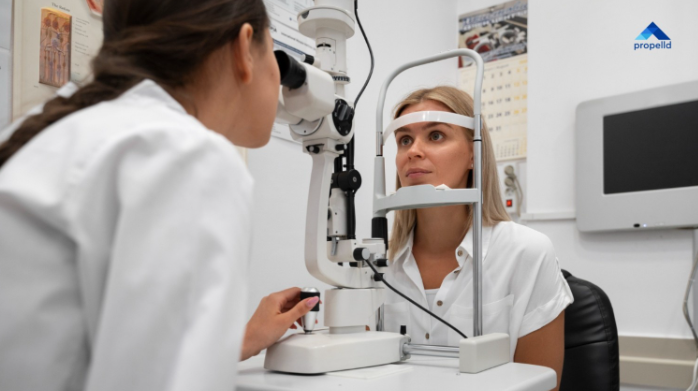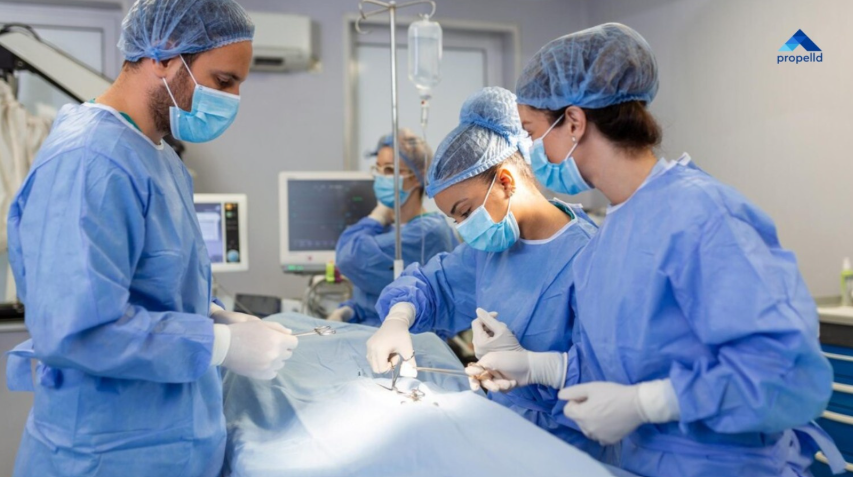A recent report suggests a 135% increase in post-graduate (PG) seats in India. This significant rise in opportunities is particularly impactful for aspiring MS students in ophthalmology. The demand for skilled ophthalmologists is increasing, resulting in more openings at prestigious institutions.
In this blog, we’ll explore the detailed steps to pursue an MS in ophthalmology, from eligibility to career prospects.
MS in Ophthalmology: Course Highlights
The MS in ophthalmology is a three-year postgraduate program that focuses on developing expertise in diagnosing and surgically managing eye disorders.
Here are some key highlights for MS in ophthalmology:
1. Comprehensive Curriculum
The program covers essential areas like basic sciences, clinical ophthalmology, surgical techniques, and eye-related pathology.
2. Surgical Training
An MS in ophthalmology provides extensive hands-on experience in performing surgeries such as cataract removal, corneal transplants, and LASIK.
3. Research Component
Students are encouraged to engage in research throughout the program, with opportunities to explore new treatments and surgical methods.
4. Clinical Rotations
Clinical rotations allow students to work under the supervision of experienced ophthalmologists in hospitals and clinics. These rotations provide practical experience in diagnosing, treating, and managing various ophthalmic conditions.
5. Subspeciality Exposure
The curriculum often includes exposure to subspecialties such as retina, cornea, paediatric ophthalmology, and oculoplastic surgery.
6. Patient Interaction
The program emphasises direct patient interaction, helping students develop strong communication skills and the ability to manage diverse patient needs effectively.
Understand the difference between MS and MD with MS vs MD: Best Colleges, Future Career Prospects, & Salary.
Get an Education Loan 10X Faster than Banks.
Eligibility Criteria for MS in Ophthalmology
To pursue an MS in ophthalmology, you need to meet specific academic qualifications, complete a required internship, and clear the necessary entrance exams.
MS ophthalmology eligibility requirements:
Now, let’s explore the syllabus and core subjects for the MS in ophthalmology.
Get an Education Loan with Higher Chances of Approval
MS Ophthalmology Syllabus: Important Topics and Books
Here is an overview of the core subjects covered in the curriculum, along with recommended textbooks to aid your studies.
To make a career as an MS in ophthalmology, check out NEET PG Syllabus 2024-25: Subject-wise Weightage & Pattern.
Step-by-Step Guide to Becoming an MS in Ophthalmology
The Indian Government is planning to increase the total number of PG seats by 74,306. The journey of becoming an MS in ophthalmology involves academic training and hands-on experience.
Step 1: Complete MBBS from a Recognised Medical College
- Enrol in a 5.5-year MBBS program from an MCI-recognised medical college, which covers core medical subjects and foundational clinical skills.
- After completing the MBBS coursework, undertake a one-year rotating internship to gain practical experience across different specialities.
Step 2: Qualify for NEET-PG Examination
- Prepare and understand the NEET PG exam pattern, which assesses your understanding of the medical subjects covered during your MBBS.
Step 3: Participate in Counselling and Seat Allotment
- Participate in the All India Quota or State Counselling, where seat allocation is based on your NEET rank, reservation category, and available seats.
- Ensure you have all the necessary documents, including MBBS marksheets, NEET-PG scorecard, internship completion certificate, and identity proof, for document verification and final seat allotment.
Step 4: Enrol in Three-Year MS Ophthalmology Program
- The first year focuses on mastering the fundamentals of ocular anatomy, physiology, and pathology.
- In the second and third years, you will gain in-depth exposure to surgical techniques, including cataract surgery, retinal procedures, corneal transplants, and laser therapies.
Step 5: Obtain Certifications
- After completing your program, you must register with the MCI or the respective state medical council to practice as a certified ophthalmologist.
- Post-MS, you can pursue subspecialty fellowships in areas like retina, cornea, oculoplasty, or paediatric ophthalmology to gain advanced expertise.
Explore top postgraduate medical institutes with Top MS Colleges in India 2024: Course Fees, Specialisations & Recruiters.
Scope and Future of MS in Ophthalmology: What Students are Talking About?
Discussions among medical students highlight diverse perspectives on MS in ophthalmology, emphasizing career prospects, subspecialty choices, surgical training, and future opportunities.
A Reddit user in r/indianmedschool asked:
“Why is MS OPHTHALMOLOGY being picked till 22k if it's a good branch with a decent work-life balance ?”
Insights: Ophthalmology is a sought-after branch, but its lower seat allotment compared to other specialities can make it more competitive. The decent work-life balance and financial stability make it an appealing choice, even with the increasing number of seats.
Another Reddit user in r/indianmedschool posted:
“Would it be stupid to choose Ophthalmology over General Medicine for PG?”
Insights: Choosing between ophthalmology and General Medicine depends on personal interest, career goals, and lifestyle preferences. Ophthalmology offers surgical skills and a better work-life balance, whereas General Medicine provides a broad, ever-demanding clinical scope.
What do we infer from these questions?
The two Reddit posts provide valuable insights into the factors influencing career choices in MS Ophthalmology.
- Despite having fewer seats, ophthalmology's appeal lies in its balance between a rewarding career and a manageable work-life balance.
- Ophthalmology is seen as an attractive alternative to General Medicine, particularly for those interested in surgery and lifestyle benefits.
- Limited seat availability in ophthalmology makes it a more competitive choice, despite its many advantages.
Tip: If you are drawn to a surgical speciality with a good work-life balance, ophthalmology could be the right choice for you.
Top Colleges for MS in Ophthalmology in India in 2025
Choosing the right college for an MS in ophthalmology is essential for comprehensive training and career growth.
Here are some of the best colleges for MS ophthalmology in India offering the program.
Acquire a prominent medical career with How to Choose a Good Medical College?
Career Opportunities After an MS in Ophthalmology
After completing an MS in ophthalmology, you can explore a variety of career paths, both in clinical practice and academic fields.
1. Clinical Practice
You can set up your private practice or join hospitals as a consultant ophthalmologist. This allows you to diagnose and treat a wide range of eye disorders.
2. Academic Roles
With an MS in ophthalmology, you can teach in medical colleges or universities. This provides an opportunity to shape the next generation of ophthalmologists while engaging in research.
3. Subspecialisation and Fellowships
You can pursue fellowships in areas such as retina, cornea, or oculoplasty to gain advanced expertise in these fields. The MS ophthalmology salary in India can significantly increase with subspecialisation, with some roles earning between ₹10 and ₹ 20 lakhs annually.
4. Research and Development
Many MS ophthalmology graduates choose to work in research, contributing to advancements in eye care. Research roles often focus on developing new treatments, surgical techniques, and diagnostic methods.
An MS in ophthalmology opens up diverse career opportunities in clinical practice, teaching, and research, with specialisation enhancing your expertise. The program equips you with in-depth knowledge of eye care and surgical procedures, preparing you for various roles in the field of ophthalmology. To excel, focus on refining your surgical skills, stay updated with advancements, and consider further subspecialisation for long-term career growth.
If you are worried about the finances for your MS in ophthalmology in India? Propelld can help you secure your career with its full range of digital, customised loan options, along with zero hidden charges, quick approvals, and more.
Don’t let finances affect your ophthalmology career. Apply with Propelld today and focus your career in MS in ophthalmology!











.svg)